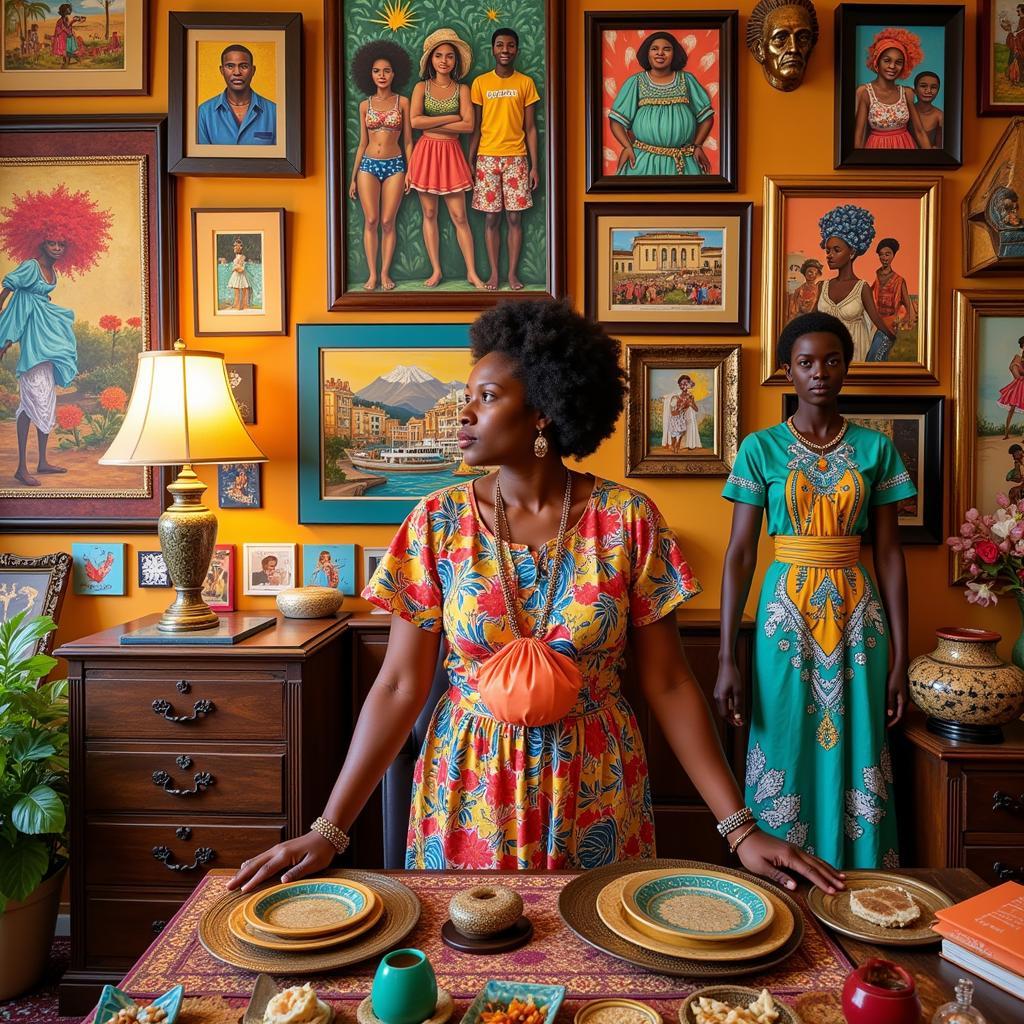Exploring the Rich Tapestry of African Customs and Traditions
African customs and traditions are as diverse and vibrant as the continent itself. From the bustling markets of Marrakech to the serene landscapes of the Serengeti, each region boasts unique cultural practices that have been passed down through generations. These traditions offer a fascinating glimpse into the rich history, spiritual beliefs, and social structures of various African communities. This article delves into the heart of these customs, exploring their significance and celebrating their enduring legacy.
The Significance of Family and Community in African Traditions
Family and community are cornerstones of African life. Respect for elders is deeply ingrained, and their wisdom is highly valued in decision-making processes. Extended family networks provide vital support systems, ensuring that everyone feels connected and cared for. This strong sense of community fosters a spirit of Ubuntu, a Nguni Bantu term that emphasizes the interconnectedness of all humanity. Many African customs and traditions revolve around strengthening these familial and communal bonds.
Numerous rituals and ceremonies highlight the importance of family. For instance, naming ceremonies are elaborate events celebrating the arrival of a new member. Traditional weddings are not just a union of two individuals but a joining of two families, often involving multiple days of festivities and symbolic rituals. Similarly, funeral rites are communal affairs, providing comfort and support to the bereaved family while honoring the deceased’s life and legacy.
A Kaleidoscope of Artistic Expression: Music, Dance, and Storytelling
African arts are a powerful medium for expressing cultural identity and preserving historical narratives. Music and dance are integral to everyday life, accompanying celebrations, rituals, and social gatherings. From the rhythmic drumming of West Africa to the melodic harmonies of East African vocal traditions, music serves as a universal language, conveying emotions, stories, and cultural values.
Storytelling is another cherished tradition, passed down orally through generations. Griots, or professional storytellers, play a crucial role in preserving historical knowledge, cultural values, and ancestral lineages. These narratives often incorporate proverbs, riddles, and moral teachings, enriching the cultural fabric of African societies. Visual arts, including sculpture, painting, and textile weaving, also reflect the rich symbolism and spiritual beliefs of various communities.
Spiritual Beliefs and Practices in African Customs and Traditions
Spirituality plays a significant role in shaping African customs and traditions. While diverse belief systems exist across the continent, a common thread is the reverence for ancestors and the belief in a spiritual realm that influences the physical world. Many communities practice ancestor veneration, seeking guidance and blessings from their departed loved ones. Rituals and ceremonies are often performed to appease spirits and maintain harmony between the living and the dead.
Traditional healers and diviners hold a respected position in many African societies. They possess knowledge of traditional medicine, herbal remedies, and spiritual practices, playing a vital role in healing physical and spiritual ailments. These practices are often deeply intertwined with cultural beliefs and traditions, offering holistic approaches to health and well-being.
African Customs and Traditions: A Legacy for the Future
African customs and traditions are not static relics of the past; they are living, evolving expressions of cultural identity. While facing the challenges of globalization and modernization, African communities continue to adapt and preserve their unique heritage. Understanding and appreciating these traditions is crucial not only for celebrating the rich cultural tapestry of Africa but also for fostering cross-cultural understanding and respect in an increasingly interconnected world.
In conclusion, African customs and traditions offer a profound insight into the continent’s diverse cultures and histories. From the importance of family and community to the vibrant expressions of art and spirituality, these practices continue to shape the lives of millions across Africa. By embracing and celebrating these traditions, we can ensure their enduring legacy for generations to come.
FAQ
- What is Ubuntu? (Ubuntu is a Nguni Bantu term that emphasizes the interconnectedness of all humanity.)
- What is the role of griots in African societies? (Griots are professional storytellers who preserve historical knowledge and cultural values.)
- How are family and community important in African traditions? (Family and community are cornerstones of African Life, providing support and fostering a sense of belonging.)
- What are some examples of African artistic expressions? (Music, dance, storytelling, sculpture, painting, and textile weaving are all forms of African artistic expression.)
- What is the significance of ancestor veneration in African spirituality? (Ancestor veneration is a common practice in African spirituality, where people seek guidance and blessings from their departed loved ones.)
- How are traditional healers viewed in African societies? (Traditional healers are respected figures who possess knowledge of traditional medicine and spiritual practices.)
- Why are African customs and traditions important to understand? (Understanding African customs and traditions promotes cross-cultural understanding and respect.)
For further assistance, please contact us at Phone Number: +255768904061, Email: kaka.mag@gmail.com or visit us at Mbarali DC Mawindi, Kangaga, Tanzania. We have a 24/7 customer service team.
